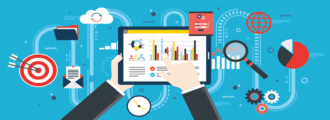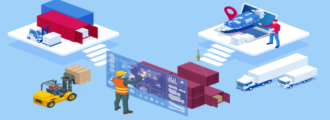In today’s fast-paced retail landscape, businesses must adapt and evolve to ever-changing market trends and remain competitive in a growing industry landscape.
Enter Retail ERP systems — powerful solutions designed to streamline retail operations, unify data, and drive business growth. With various features and capabilities, these systems are revolutionizing how retailers operate. But how do you choose the right one for your business?
In this blog post, we’ll discuss the essentials of retail ERP systems, top vendors, and the future of retail ERP, how Retail ERP software can help companies manage inventory and optimize productivity, and where our team of expert ERP consultants can fit in your organization.
Exploring the Essentials of Retail ERP Systems
The world of retail is constantly evolving, and Retail ERP systems have emerged as critical players in shaping the industry’s future. These comprehensive platforms facilitate all business operations within a company, offering industry-specific capabilities to effectively manage an e-commerce business, optimize customer experience, and manage shipping.
Retail ERP systems operate in real-time, providing the necessary functionalities for retail business processes and workflows, enabling retailers to:
- Assess profitability at the SKU or item level
- Streamline processes
- Minimize expenses
- Increase customer satisfaction
Next, we’ll explore the key components of a retail ERP system, such as:
- Inventory management
- Supply chain management
- Demand forecasting
- Customer management
Defining Retail ERP Software
The primary purpose of enterprise resource planning software for retail organizations is to simplify business processes and data and optimize operations and communication between different departments.
Retail ERP systems stand out from traditional ERP systems by requiring fewer customizations to accommodate retail functions and typically having basic e-commerce integrations pre-built, providing retailers with both time and cost savings.
Retail ERP software provides a single system that combines various retail processes, such as:
- Inventory
- Sales
- Finance
- HR
Assessing retail ERP software requires thoroughly examining modules like Point-of-Sale, payment processing, shipping, and Customer Relationship Management.
Key Components of a Retail ERP System
A retail ERP system encompasses several key components, including:
- Inventory management: offers real-time stock management and inventory counts, facilitating automation of repetitive tasks and real-time stock counts for customers.
- Supply chain management: helps streamline operations and optimize supplier management through real-time data synchronization.
- Demand forecasting: helps retailers predict customer demand and optimize inventory levels.
- Customer management: allows retailers to manage customer data, track customer interactions, and personalize the shopping experience.
The Impact on Retail Business Growth
Retail ERP systems can considerably influence business growth by optimizing efficiency, cutting down costs, and augmenting customer satisfaction. By leveraging Retail ERP systems, companies can prevent stock-outs, boost efficiency, gain real-time visibility into inventory levels, and streamline data exchange between departments.
Additionally, retail ERP systems can enhance accuracy in accounting and financial reporting, reduce lost profits and inefficiency, and augment the productivity of accounting personnel, further improving organizational success and profitability across teams.
Top 4 ERP Vendors for Retail Organizations
As the retail industry continues to evolve, so do the ERP solutions available to retail companies, and each vendor offers unique features and capabilities to cater to the diverse needs of retail businesses.
Among the top ERP vendors for retail organizations are:
- SAP
- Infor
- UKG
- Workday
The subsequent sections describe each vendor’s offerings, offering greater insight into how they can empower business users to improve productivity and thrive in a competitive retail environment.
SAP
SAP is a well-known player in the ERP market, offering industry-specific retail ERP solutions with a focus on scalability and customization across their stock and inventory management operations.
Some key features of SAP Business One Professional for retailers include inventory management, demand forecasting, and purchasing management to optimize retail operations. Other features included in SAP Business One Professional apply to various retail industries, such as retail, merchandising, catering, sports, and e-commerce.
Infor
Infor offers cloud-based retail ERP systems with integrated advanced analytics and AI capabilities, setting it apart from other vendors and helping retail businesses reach their critical return on investment goals.
Infor’s Retail ERP systems provide:
- Supply chain and inventory management
- Data management
- Talent management
- Planning
- Collaboration
- Sourcing capabilities
The Infor Coleman AI platform offers the following benefits for retailers:
- Analyzing extensive data sets
- Providing actionable insights
- Assisting in making data-driven decisions
- Optimizing inventory management
- Forecasting demand
- Personalizing customer experiences
- Improving overall operational efficiency.
UKG
UKG specializes in workforce management and HR solutions, making it a valuable ERP vendor for retail organizations looking to streamline and optimize their core people and inventory management tools.
By offering streamlined administrative and HR tasks, UKG allows retail businesses to:
- Have more time for customer interaction
- Focus on training
- Enhance the customer experience
- Foster business growth
Workday
Workday is another prominent ERP vendor offering a unified platform for finance, HR, project management, and workforce planning in the retail industry. Workday’s integrated approach to finance, HR, and planning makes it a comprehensive solution for retail businesses looking to streamline their operations and excel in the market.
Workday’s ERP system provides:
- Easy onboarding
- Personalized career guidance
- Optimized schedules
- Financial management
- Real-time analytics and reporting
- Talent management
- Time tracking
- Recruiting
- Employee self-service
Identifying the Best Retail ERP Solutions for Your Business
Given the plethora of retail ERP solutions on the market, pinpointing the one that best suits your business can be challenging. Key factors to consider include:
- Customization: Allow your ERP system to adapt to your unique business needs
- Scalability: Ensure the system can grow with your business
- Integration: Ensure seamless data flow across retail processes and improve efficiency.
Customization and Scalability
Customization and scalability are crucial for adapting to changing business needs and growth, enabling businesses to meet customer needs, drive customer satisfaction, and seize new growth opportunities.
Customization allows businesses to tailor their products or services to meet their customers’ exact needs and preferences, resulting in improved customer satisfaction, loyalty, and the acquisition of new customers.
Scalability is the ability of a company to grow and expand without compromising efficiency or quality. This can enable businesses to capitalize on growth opportunities, increase market share, and achieve sustainable growth.
Integration Capabilities
Integration capabilities are essential for ensuring seamless data flow between various retail processes and systems. Retailers should evaluate retail ERP software with pre-built integrations or an open API for custom connections to streamline interdepartmental communication and improve overall operational efficiency.
By integrating sales and CRM systems with ERP software, retail businesses can quickly access customer data from one page, including purchase history, logistics and delivery information, and service cases, thus providing a competitive edge in the market.
Inventory Optimization with Retail ERP
Optimizing inventory is critical to retail success, and retail ERP systems play a vital role in achieving this goal. Through real-time inventory tracking and streamlined warehouse management, retail ERP systems help businesses maintain optimal inventory levels, maximize sales, and minimize costs.
Real-Time Inventory Tracking
Real-time inventory tracking is an essential feature of retail ERP systems that enables businesses to:
- Monitor their inventory in real-time, furnishing current data on stock levels, availability, and location
- Provide immediate visibility into inventory, allowing companies to track and manage stock levels accurately and efficiently
- Gain invaluable insights into past and future demand, SKU, and channel performance
- Enable streamlined operations and cost reduction
This system gives retailers the tools to manage their inventory and optimize their business operations more effectively. Real-time inventory tracking can significantly enhance customer satisfaction and drive business growth by avoiding stockouts and optimizing order fulfillment.
Streamlined Warehouse Management
Streamlined warehouse management is another crucial feature of retail ERP systems that enables businesses to optimize their critical warehouse and vendor management operations. This includes:
- Automated stock input, output, and movement information exchange between the warehouse and front-office systems and apps
- Automating tasks and providing visibility into warehouse operations
- Decreasing costs
By utilizing enterprise retail industry software, businesses can streamline their warehouse management and improve efficiency. This, in turn, enhances efficiency and reduces operational costs, contributing to the overall success of the retail business.
Enhancing Customer Satisfaction through ERP
Customer satisfaction is paramount in the retail industry, and ERP systems can play a significant role in achieving this goal. By integrating CRM systems and automating sales processes, retail ERP systems can help businesses deliver personalized and effective customer experiences.
CRM Integration
CRM integration is key in managing customer data and interactions for personalized experiences. By integrating CRM systems with retail ERP software, businesses can:
- Streamline customer data management
- Enhance customer experiences
- Increase efficiency and productivity
- Improve decision-making.
Retail ERP solutions like Microsoft Dynamics 365 Business Central, SAP Business One Professional, and Infor CloudSuite Retail enable businesses to improve customer relationship management and drive customer satisfaction.
Sales Automation and Order Management
Sales automation and order management are crucial in streamlining sales processes and improving customer satisfaction. Retail ERP systems with sales automation capabilities can improve sales efficiency by automating and optimizing various sales processes, such as:
- Lead management
- Opportunity tracking
- Contact management
- Automated sales activities
By providing sales teams with a comprehensive view of customer information, purchase histories, and preferences, retail ERP systems enable them to effectively manage and nurture customer relationships, increasing productivity and enhancing customer satisfaction.
Financial Mastery with Retail ERP
Financial mastery is critical to retail success, and retail ERP systems can play a vital role in achieving this goal. Retail ERP systems help businesses in the following ways:
- Comprehensive finance management
- Profitability analysis
- Making informed decisions
- Optimizing resources
- Driving business growth
Comprehensive Finance Management
Comprehensive finance management is a vital tool for retail businesses to make the most of their resources and achieve efficiency and profitability goals. Retail ERP software provides financial management tools that retailers can use to ensure success.
By effectively managing financial data and generating accounting reports, comprehensive finance management can help retailers make informed decisions and optimize their resources.
Profitability Analysis and Reporting
Profitability analysis and reporting are essential components of financial mastery in retail ERP, enabling organizations to gain insights into their performance and identify critical areas of improvement.
By organizing costs and revenues into value groups, determining profits from various segments of the business, and revealing information about revenue streams, profitability analysis can help businesses identify areas of high profitability and make informed decisions to optimize their operations and maximize profits.
Core profitability and analysis functionality is included in Retail ERP systems, like:
- Acumatica
- NetSuite
- Infor
- Epicor
- Microsoft Dynamics 365
- QuickBooks POS
Selecting the Right Retail ERP Software: A Step-by-Step Process
Selecting the right retail ERP software for your business is a crucial decision that requires careful consideration of various factors, such as budget, vendor selection, and support services. Implementing an enterprise resource planning ERP system can significantly enhance your company’s efficiency and productivity.
Here are a few critical considerations for organizations looking to implement new Retail ERP software:
Budget Considerations for Retail ERP Cost
When selecting retail ERP software, it’s essential to consider the cost, which will depend on the number of users, desired features, and the vendor’s pricing model. Additional fees may include a one-time implementation or training fee and a monthly fee. By considering these factors, you can ensure that you select the most cost-effective retail ERP solution for your business.
Vendor Selection and Support Services
Vendor selection and support services are crucial for the successful implementation of a retail ERP system and long-term success. A vendor with robust support services and access to critical business intelligence tools ensures that any issues or challenges that arise during or after implementation are addressed promptly and effectively.
They provide:
- Training
- Technical support
- System updates
- Assistance in customizing the ERP system to meet the specific needs of the retail business
Working with a reliable vendor can significantly contribute to the successful implementation of your retail ERP system and the overall success of your business.
The Future of Retail: Dynamics 365 and Beyond
As the retail industry continues to evolve, so too does the landscape of retail ERP systems. The future of retail ERP lies in advanced analytics, AI integration, and omnichannel experiences. Let’s take a look at a few ground-breaking trends and their role in shaping the future of retail ERP systems, equipping businesses to maintain their competitive edge and flourish in the dynamic retail landscape.
Advanced Analytics and AI Integration
Advanced analytics and AI integration are revolutionizing how retail businesses operate by enabling data-driven decision-making and predictive capabilities. By leveraging these powerful technologies, retail businesses can stay ahead of the competition and drive growth in the rapidly evolving market.
Retailers can benefit from advanced analytics and AI integration in Dynamics 365 by:
- Gaining insights into customer behavior
- Predicting demand
- Optimizing inventory planning
- Optimizing operations
- Increasing supply chain efficiency
- Uncovering new business prospects.
Omnichannel Experience and E-commerce
Omnichannel experiences and e-commerce integration are essential for retailers to stay competitive in the evolving retail landscape.
By providing a consistent customer experience across multiple channels, such as online, mobile, and physical stores, retail businesses can increase customer satisfaction, engagement, and sales through personalized interactions with the brand.
Implementing an omnichannel experience in retail can increase operational efficiency, cost savings, improved customer retention and loyalty, higher revenue, a smoother customer journey, more integrated business operations, enhanced customer insight, and an improved overall customer experience.
How Can We Help?
Whether you need help outlining a project plan for a new Retail ERP implementation, additional support navigating intelligent business intelligence and reporting functionality for improved data analysis, or just an extra hand leveraging ERP software to improve overall efficiency, Surety Systems is here to help.
Our senior-level ERP consultant team has extensive knowledge and experience in various Retail ERP solutions, including SAP, Infor CloudSuite, Workday, UKG, and Microsoft Dynamics 365. We have what it takes to ensure your critical project needs are met and help you achieve continued success over time.
Getting Started with Us
Interested in learning how intelligent retail industry software can improve overall personnel, inventory, and supply chain management for your organization? Ready to get started on a project with our team of expert ERP consultants?
Contact us today for more information!
Frequently Asked Questions
What is ERP vs CRM vs MRP?
ERP is a broad collection of business software that automates multiple processes, such as sales, finance, and HR management. An MRP system focuses on manufacturing processes specifically, while CRM systems focus on customer-related activities. ERPs provide an encompassing view of all aspects of an enterprise, whereas MRPs are solely concentrated on materials management.
What is Retail ERP software?
Retail ERP software provides tailored solutions to integrate and connect the vital business processes necessary for retail operations. By utilizing this solution, retailers can improve tracking, assessment, and streamlining of these key processes.
What are the key components of a Retail ERP system?
The critical components of a retail ERP system are inventory management, supply chain management, demand forecasting, and customer management.



